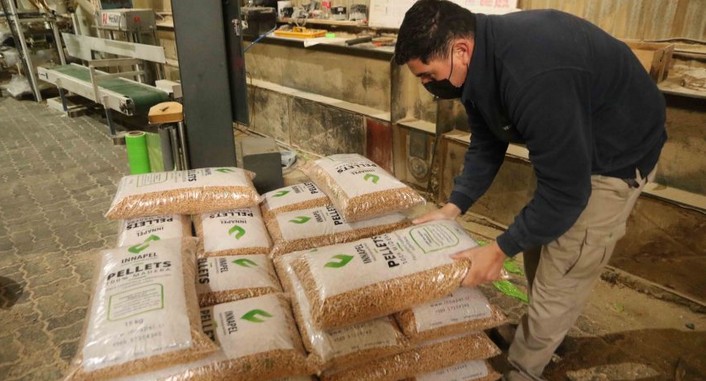- Compared to last year, demand is lower due to advance purchases and fears of a repeat shortage. Currently, there is overproduction in the Region, which is expected to keep prices stable for 15 kg bags.
Due to the frost that has been affecting the area for several weeks, some producers and sellers have seen pellet demand increase by approximately 20% to 30% in the Region. It is projected that, overall, the product will remain in higher demand amid rising electricity tariffs.
Daniela Espinoza, Energy Ministerial Secretary (Seremi) of Biobío, stated regarding the pellet market that it is a healthy market with no supply or stock issues. "In fact, national data as of May 2024 shows that stock levels for that month quadrupled compared to the same period last year. Additionally, production and shipments have increased, so all conditions are in place for pellets to continue positioning themselves as a real alternative for heating homes in the south-central part of the country."
It should be noted that this heating alternative competes, for example, with options that consume electricity amid rising tariffs due to their unfreezing. A subsidy was available for this, but the application deadline expired on the 14th of this month.
Regarding applications for the electricity bill subsidy, the regional Energy Ministerial Secretary detailed, "Nationally, applications for the (electricity) subsidy exceeded 1,600,000 households, while regionally, the figure was 174,864. Results will be published in the second half of September, and we hope to triple the number of beneficiaries in the coming periods, reaching 4,700,000 households, as committed by the government. The benefit will be reflected in October."
Biomass Association
Antonio Minte, General Manager of the Chilean Biomass Association, noted that the Biobío Region is clearly "the most important in pellet production, accounting for over 70% to 75% nationally. However, this has been changing as Maule, with interesting projects, and Araucanía have been entering the market."
According to the General Manager of the Chilean Biomass Association, they now aim for the local pellet industry to see higher demand and for end consumers to have access to a cheaper fuel "compared to electricity or any other energy source, as biomass seeks to remain the most accessible fuel in Chile."
Minte added, "Compared to last year, we see somewhat lower demand, but this is heavily influenced by 2023 being a response year to the 2022 shortage. Many consumers may have bought more than they needed, fearing scarcity, and those purchases were also made early due to recommendations that winter production can face difficulties. This created additional fear-driven early buying, making 2023 sales appear slightly higher than what we expect for 2024."
Another key point for the executive was that "now, with electricity prices set to rise significantly—around 60% or more—and continue increasing after January next year due to calculation methods, pellets will remain the most accessible energy source for everyone." When asked if higher equipment costs could curb pellet demand, he said, "To some extent, yes, but when people see the greater savings, they realize the equipment pays for itself quickly due to energy cost differences."
Stove Subsidy
Asked about the impact of government subsidies for replacing wood stoves with more efficient pellet stoves, Antonio Minte explained, "That plan aimed to reduce pollution in saturated cities and continues today. Unfortunately, there was a push for more electric equipment, but now electricity faces price issues. We hope pellets regain their previous replacement rate of 75% user preference."
Minte emphasized that this was a user choice, "as the state didn’t mandate pellets but offered 4-5 technologies, and users preferred pellets. The past pellet shortage eroded trust, but today, production capacity has more than doubled, and we project 2-3 years of sustained growth, for which the industry is prepared."
Producers and Sellers
Viviana Acevedo, Commercial Manager of Innapel, stated that demand has been rising and is projected to continue increasing during winter. "Due to frost and cold, customers are buying early for August. Compared to other heating fuels, pellets are currently the most economical."
The company sells online and at their Talcahuano location (Monseñor Alarcón #444), offering discounts because "customers who bought in December have run out due to extreme cold, consuming 20%-30% more than normal, while prices remain similar to off-season levels," Acevedo noted.
Senior Citizen Offer
"We always have special offers for seniors, who use more pellets. We maintain discounted in-person purchase prices year-round, but today we further reduced the price to $3,690 per 15 kg bag (no limit), down from $4,290. For all customers, due to recent frost, the Talcahuano branch price is $3,790, launched about an hour ago (yesterday)," Acevedo detailed.
Hugo Pulgar, Plant Manager at Greenpellet (a manufacturer and seller based in Talcahuano), said this year's demand has been slightly lower than last year's.
On demand projections amid rising electricity bills, he noted, "Existing pellet stove users will likely continue, while new customers choosing between AC or pellets may prefer pellets due to lower electricity consumption."
Pulgar expects pellet prices to fluctuate, as "many producers use electric motors, but supply has also increased with new brands. Prices may drop until next year, when weaker producers exit the market."
Greenpellet sells 15 kg bags wholesale and retail, with retail prices "starting at $3,900 in-store, and home delivery (minimum two bags) from $4,100. Over 180 bags are quoted separately," the Plant Manager stated.
Stephanie, a salesperson at Pellet Ecofuego (Maipú #1380, Concepción), observed lower demand than last year but expects it to rise as "electric heating becomes costlier. Pellet prices will likely stay low. We sell 15 kg bags at $3,990, with home delivery available."
Source:diarioconcepcion.cl







Comentarios (0)
No hay comentarios aún. ¡Sé el primero en comentar!
Deja un comentario